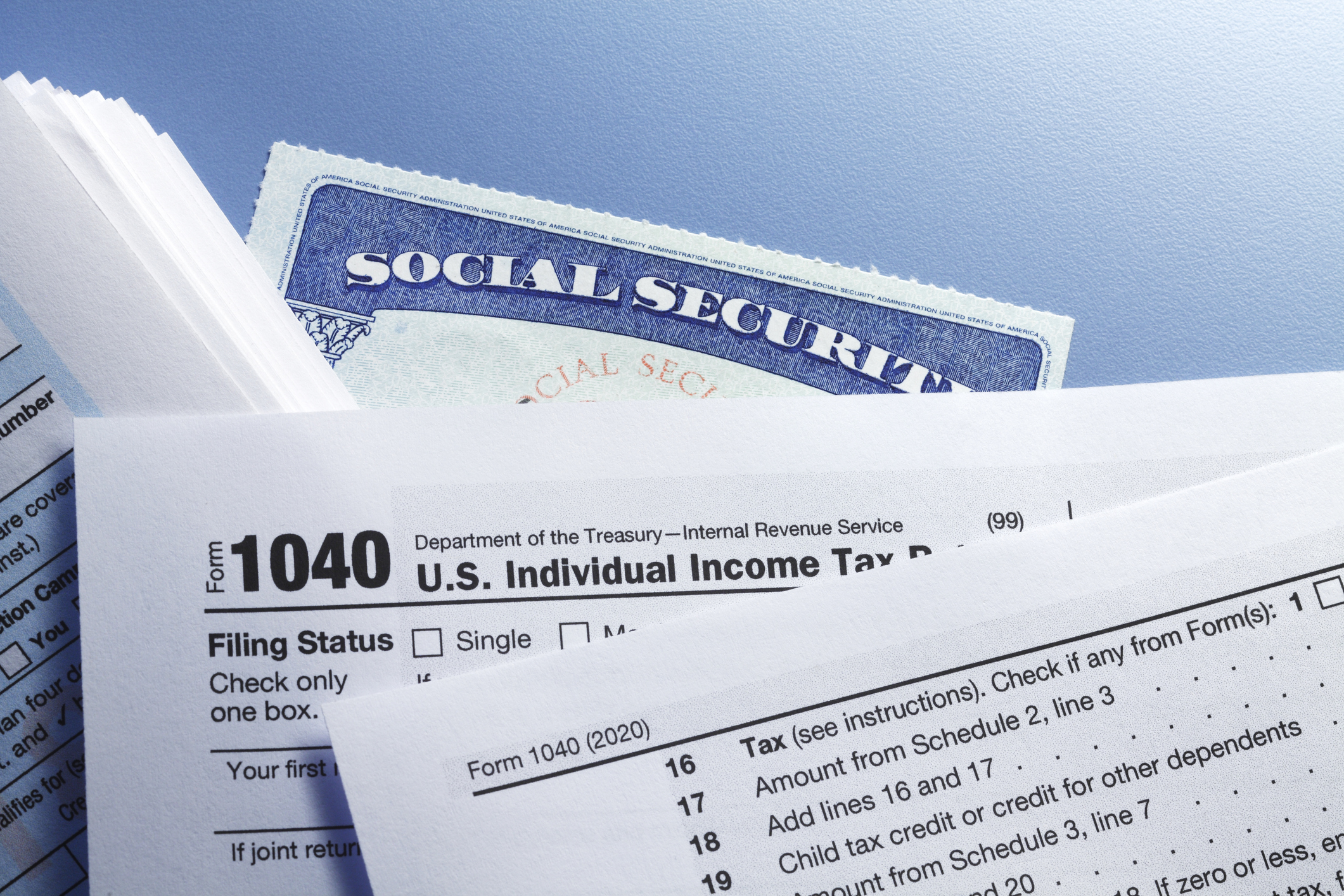How to Calculate Taxes on Social Security Benefits
The federal government can tax up to 85% of your Social Security benefits, so it's good to know how those taxes are calculated.


Profit and prosper with the best of Kiplinger's advice on investing, taxes, retirement, personal finance and much more. Delivered daily. Enter your email in the box and click Sign Me Up.
You are now subscribed
Your newsletter sign-up was successful
Want to add more newsletters?
It might come as a surprise, but Social Security benefits are not entirely tax-free.
Depending on your income, up to 85% of your Social Security benefits can be subject to tax. That includes retirement and benefits from Social Security trust funds, such as survivor and disability benefits, but not Supplemental Security Income (SSI).
The chance of paying taxes on your Social Security benefits is higher when you have significant taxable income from a job, pension or traditional IRA, for example.
From just $107.88 $24.99 for Kiplinger Personal Finance
Become a smarter, better informed investor. Subscribe from just $107.88 $24.99, plus get up to 4 Special Issues

Sign up for Kiplinger’s Free Newsletters
Profit and prosper with the best of expert advice on investing, taxes, retirement, personal finance and more - straight to your e-mail.
Profit and prosper with the best of expert advice - straight to your e-mail.
Because SS income thresholds haven't been indexed for inflation, a growing share of retirees now owe taxes on Social Security benefits even if their purchasing power hasn't increased.
However, many people who only have income from Social Security don’t pay income taxes on their benefits at the federal level.
Like other forms of retirement income taxed by the IRS, taxes on Social Security benefits are a possibility for retirees, it’s important to know how Social Security taxes are calculated.
The Extra Standard Deduction for Those 65 and Older: The extra standard deduction can help older adults reduce their taxable income. Here's how.
How to calculate tax on Social Security benefits
Each January, after you begin receiving Social Security benefits, you will receive a statement (Form SSA-1099) showing the total benefits you received in the previous year.
When determining how much you might be taxed, the first step is to calculate your "combined income."
The IRS says your combined income is your adjusted gross income (AGI) plus nontaxable interest and half your Social Security benefits from the year. You then take away certain deductions and exclusions.
The following tiered system determines the percentage of your benefits that are taxable.
- If your combined income is under $25,000 (single) or $32,000 (joint filing), there is no tax on your Social Security benefits.
- For combined income between $25,000 and $34,000 (single) or $32,000 and $44,000 (joint filing), up to 50% of benefits can be taxed.
- With combined income above $34,000 (single) or above $44,000 (joint filing), up to 85% of benefits can be taxed.
Combined Income (Single) | Combined Income (Joint) | Taxable Portion of SS Benefits |
|---|---|---|
Under $25,000 | Under $32,000 | 0% |
$25,000 – $34,000 | $32,000 – $44,000 | Up to 50% |
Above $34,000 | Above $44,000 | Up to 85% |
If you need clarification on whether your Social Security benefits are taxable, the IRS has a tool on its website that can help.
Once you know how much of your benefits are taxable, you must include that amount on Line 6b of Form 1040.
That income will be taxable, along with any other income, based on your tax bracket and the income tax rate tied to it.
Note: The percentage of Social Security benefits that might be taxable due to SS income thresholds is a separate determination from your ordinary income tax bracket.
Also, keep in mind that one-time events such as selling a home, cashing out investments, or receiving a lump-sum payment can increase your combined income for a given year.
Tax on lump-sum payment from Social Security
When calculating taxes on your Social Security benefits, you should include the taxable portion of any lump-sum payment you received during the year. (That's true even if that payment includes benefits from a previous year.)
However, the inclusion might lower the taxable portion of your benefits. In that case, the IRS says you can elect to figure the taxable part of a lump-sum payment for an earlier year separately, using your income for the previous year.
Note: Lump-sum retirement benefits differ from lump-sum death benefits. It's important to note that no part of a lump-sum death benefit paid by the Social Security Administration (SSA) is taxable.
How to withhold taxes from Social Security payments
It's important to plan if you know some of your Social Security benefits will be taxed. To avoid surprises, you can request that federal income taxes be withheld from your monthly payments.
- To do this, you must fill out Form W-4V and submit it to your local Social Security office.
- You can choose a withholding rate of 7%, 10%, 12%, or 22%.
- Withholding taxes from your Social Security payments is one way to cover your potential tax liability before tax day arrives.
If you prefer not to have taxes deducted from your monthly Social Security payments, you can make quarterly estimated tax payments.
Regardless of the method, the goal is to ensure you've paid enough tax to avoid an underpayment penalty from the IRS when you file your income tax return.
State tax on Social Security benefits
In addition to federal taxes, some states tax Social Security benefits. However, the methods and extent of taxation vary.
For example, New Mexico technically taxes Social Security benefits, but many retirees will not pay a dime to the state on that income at tax time. That’s because state legislation provides higher income thresholds in New Mexico for exempting Social Security benefits.
West Virginia has been working to phase out its tax on Social Security benefits. The move, initiated by legislation passed a couple of years ago, represents a significant policy shift.
Update: As of January 1, 2026, West Virginia has officially completed the phase-out. All Social Security benefits received this year will be fully deductible when WV residents file their 2026 state taxes in early 2027.
Some proponents say it will make West Virginia more attractive to retirees and ease the financial burden on its aging population.
(For more information, see Taxes on Social Security: Two States Make Big Changes.)
Although you can't have state taxes withheld from Social Security benefits, you might be able to make estimated state tax payments.
Contact your state's Department of Revenue for information about estimated tax payment rules where you reside.
Read More
- Five Things To Know About Social Security and Taxes
- How Retirement Income is Taxed by the IRS
- Seven Ways to Reduce Taxes on Social Security Benefits
Profit and prosper with the best of Kiplinger's advice on investing, taxes, retirement, personal finance and much more. Delivered daily. Enter your email in the box and click Sign Me Up.

Kelley R. Taylor is the senior tax editor at Kiplinger.com, where she breaks down federal and state tax rules and news to help readers navigate their finances with confidence. A corporate attorney and business journalist with more than 20 years of experience, Kelley has helped taxpayers make sense of shifting U.S. tax law and policy from the Affordable Care Act (ACA) and the Tax Cuts and Jobs Act (TCJA), to SECURE 2.0, the Inflation Reduction Act, and most recently, the 2025 “Big, Beautiful Bill.” She has covered issues ranging from partnerships, carried interest, compensation and benefits, and tax‑exempt organizations to RMDs, capital gains taxes, and energy tax credits. Her award‑winning work has been featured in numerous national and specialty publications.
-
 4 High-End Experiences Worth the Splurge After 50
4 High-End Experiences Worth the Splurge After 50These curated date ideas provide the perfect backdrop for couples ready to enjoy the very best that the world has to offer.
-
 Health Care Stocks Have Sagged. Can You Bet on a Recovery?
Health Care Stocks Have Sagged. Can You Bet on a Recovery?The flagging health care sector has perked up a bit lately. Is it time to invest?
-
 Costco's Auto Program: Can Membership Pricing Really Save You Money on a Car?
Costco's Auto Program: Can Membership Pricing Really Save You Money on a Car?Costco's Auto Program can simplify the car-buying process with prearranged pricing and member perks. Here's what to know before you use it.
-
 4 High-End Experiences Worth the Splurge After 50
4 High-End Experiences Worth the Splurge After 50These curated date ideas provide the perfect backdrop for couples ready to enjoy the very best that the world has to offer.
-
 My Grandkids Want Me to Donate to Their Teams and School Fundraisers. I Adore Them, but I'm on a Budget.
My Grandkids Want Me to Donate to Their Teams and School Fundraisers. I Adore Them, but I'm on a Budget.When your heart says "yes" but your wallet says "no," there is still a way forward. Here's what financial pros say.
-
 Quiz: Do You Know How to Maximize Your Social Security Check?
Quiz: Do You Know How to Maximize Your Social Security Check?Quiz Test your knowledge of Social Security delayed retirement credits with our quick quiz.
-
 2026 Tax Refund Delays: 5 States Where Your Money Is Stuck
2026 Tax Refund Delays: 5 States Where Your Money Is StuckState Tax From New York to Oregon, your state income tax refund could be delayed for weeks. Here's what to know.
-
 Paper Tax Filers Face Long Wait as IRS Digitization Effort Stalls
Paper Tax Filers Face Long Wait as IRS Digitization Effort StallsTax Filing Last April, the IRS launched its Zero Paper Initiative to speed up paper tax return processing. The project isn’t going well.
-
 It's Time to Bust These 3 Long-Term Care Myths (and Face Some Uncomfortable Truths)
It's Time to Bust These 3 Long-Term Care Myths (and Face Some Uncomfortable Truths)None of us wants to think we'll need long-term care when we get older, but the odds are roughly even that we will. Which is all the more reason to understand the realities of LTC and how to pay for it.
-
 How One Extra Dollar of Income Can Cost You Thousands in Retirement
How One Extra Dollar of Income Can Cost You Thousands in RetirementRetirement Even modest changes in retirement income can raise Medicare premiums under IRMAA. Here’s how a small increase can affect your retirement costs.
-
 Aging in Place Can Be Bad for Your Health: This Financial Pro's Alternative Is a No-Brainer
Aging in Place Can Be Bad for Your Health: This Financial Pro's Alternative Is a No-BrainerWhy age alone in financial hardship when you can enjoy companionship — and share the costs of housing, groceries and health care — with a small community of friends?
